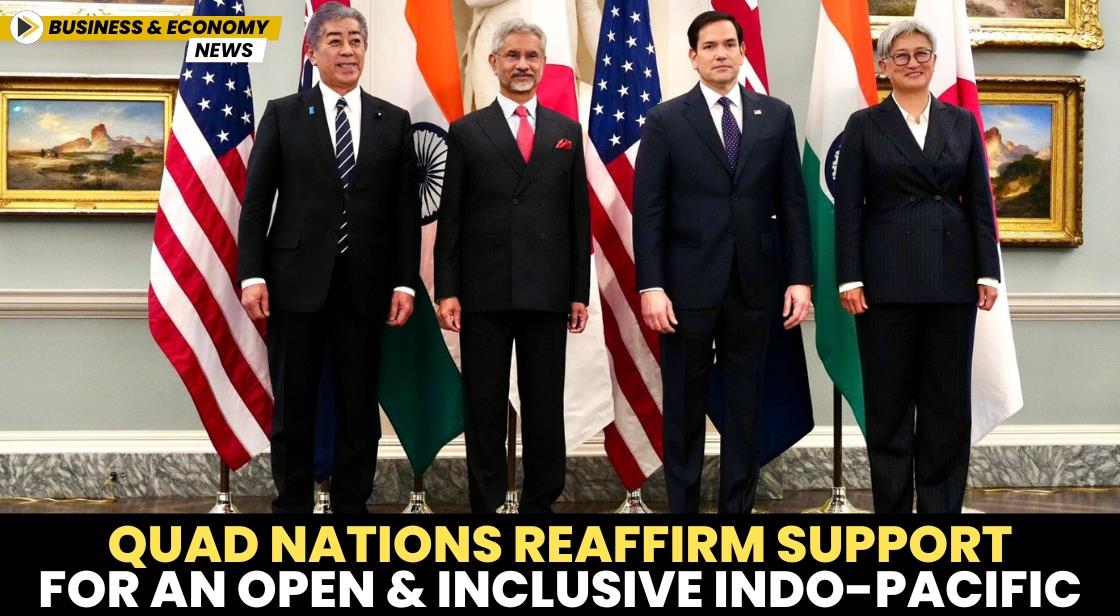Quad Nations Reaffirm Support for an Open and Inclusive Indo-Pacific

News Synopsis
The foreign ministers of the Quad nations—the United States, Australia, India, and Japan—met in Washington, D.C., on Tuesday, marking the first high-level meeting since President Donald Trump resumed office.
Hosted by U.S. Secretary of State Marco Rubio on his first day in the role, the gathering reinforced the coalition's dedication to fostering an open and inclusive Indo-Pacific region where sovereignty, territorial integrity, and international laws are upheld.
In their joint statement, the Quad ministers reiterated their collective commitment to peace and stability in the region, emphasizing the significance of the rule of law, economic opportunities, and maritime security as critical to the Indo-Pacific's growth. The statement declared opposition to “any unilateral actions aimed at altering the status quo through force or coercion.”
Quad’s Vision and Goals
The ministers underscored their commitment to enhancing:
-
Regional maritime security, crucial to counter increasing threats in the Indo-Pacific.
-
Technological and economic cooperation, ensuring resilient supply chains.
-
Collaboration on international law and democratic values, reinforcing the Quad’s guiding principles.
Advancing the Quad Agenda
The Quad leaders agreed to convene regularly to bolster their agenda ahead of the next Quad Leaders’ Summit, which will be hosted by India later this year. External Affairs Minister S. Jaishankar expressed optimism about the coalition's trajectory, highlighting the productive nature of the meeting and the unified vision of all members.
“Agreed on the importance of thinking bigger, deepening the agenda, and intensifying our collaboration,” Jaishankar said, affirming the Quad’s role as a stabilizing force in the face of global uncertainties.
A United Front Against Coercion
During the meeting, the foreign ministers voiced a strong stance against coercive actions that threaten peace in the region. “We reaffirm our shared commitment to strengthening a Free and Open Indo-Pacific,” the statement noted, underlining the Quad's dedication to safeguarding territorial sovereignty and democratic values.
Quad: A Partnership for Progress
The Quad partnership represents a strategic alliance aimed at fostering inclusivity, resilience, and prosperity across the Indo-Pacific. By addressing regional challenges and seizing opportunities, the Quad nations aspire to build a secure and sustainable future.
What is Quad?
The Quad, or the Quadrilateral Security Dialogue, is a strategic alliance involving four countries:
-
India
-
Australia
-
Japan
-
The United States
It was initially conceptualized in 2007 as a response to shared concerns about regional security, particularly in the Indo-Pacific region. The partnership emphasizes cooperation on a wide range of issues, including:
-
Maritime security: Ensuring free and open sea lanes of communication.
-
Economic collaboration: Strengthening trade and resilient supply chains.
-
Technology partnerships: Advancing innovation and countering emerging technological threats.
-
Humanitarian efforts: Coordinating disaster relief and health initiatives.
Purpose of Quad
The alliance aims to promote:
-
A free and open Indo-Pacific, with respect for international laws.
-
Regional stability and peace by countering coercive or aggressive behaviors.
-
Collaboration on shared global challenges like climate change, cybersecurity, and public health.
Importance of Quad in the Indo-Pacific
The Indo-Pacific is a strategically significant region, representing:
-
Over 50% of the global population.
-
Nearly 60% of the global GDP.
By aligning their efforts, Quad nations aim to maintain regional security, economic growth, and freedom of navigation, while countering potential threats, particularly from nations that challenge the status quo through coercion.
Recent Developments
In recent years, the Quad has expanded its scope from a security-focused dialogue to include partnerships in:
-
Vaccine distribution (COVID-19).
-
Infrastructure development.
-
Clean energy initiatives.
Key Features
-
Informal group: Quad is not a formal military alliance like NATO, but it emphasizes dialogue and collaboration.
-
Annual summits: Leaders and foreign ministers meet regularly to set the agenda.
-
Shared values: All member nations uphold democracy, rule of law, and sovereignty.
The Quad remains a critical diplomatic forum for addressing challenges and promoting stability in the Indo-Pacific and beyond.
You May Like









